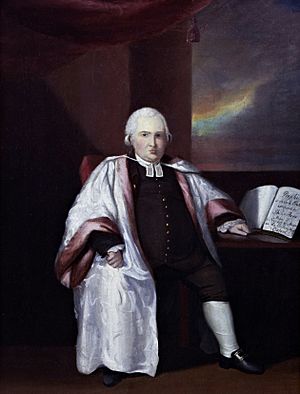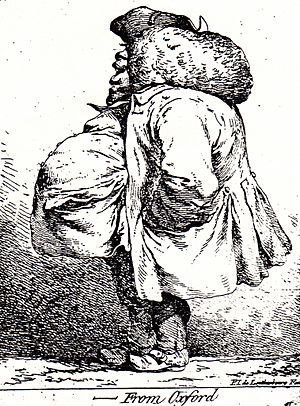Philip Hayes (composer) facts for kids
Philip Hayes (born in 1738, died in 1797) was a talented English musician. He was a composer, meaning he wrote music. He also played the organ, sang, and led musical groups as a conductor.
Life and Music Career
Philip Hayes was born in Oxford, England. His father, William Hayes, who was also a composer, taught him music when he was young.
Philip studied music at university. In 1763, he earned a special music degree called a Bachelor of Music (B.Mus). He got this degree for a musical play he wrote called Telemachus. Later, in 1777, he earned an even higher degree, a doctorate.
From 1767, Philip sang at the Chapel Royal in London. This was a famous choir that sang for the King or Queen. But in 1776, he moved back to Oxford. He became the organist at New College, Oxford. He also helped his father, who was not well.
When his father passed away in 1777, Philip took over many of his important jobs. He became the Heather Professor of Music at Oxford University. This was a very important teaching role. He also became the organist at Magdalen College, Oxford and the University Church. In 1790, he added another job as organist at St John's College.
As a professor, Philip would give special musical performances instead of regular lectures. These included odes (poems set to music) and oratorios (large musical works, often religious). They were performed at the Oxford Music School.
In 1780, he became the conductor for a big yearly music event at St Paul's Cathedral in London. In 1791, he was in charge when the famous composer Haydn visited Oxford. Philip was one of the first English conductors to use a rolled-up paper to beat time for the musicians.
People in Oxford often joked about Philip Hayes. He was known for being a bit difficult and for being quite large. He often traveled to London in a post chaise (a type of carriage). People would playfully call him 'Fill Chaise' because of his name and his size! A cartoon of him was even made in 1790.
Philip Hayes's music was a mix of old and new styles. He respected the music of older composers like Handel. But he also understood newer, classical styles. He was also very interested in even older music, like that of Purcell. He added many old music books to his father's large music library.
Philip was creative with the instruments he used. From 1763, he often included clarinets in his music. His six keyboard concertos (written in 1769) were the first in England to be published for the early piano.
Philip Hayes died in London when he was 58 years old. After he died, his unpublished music and his father's works were given to the Bodleian Library in Oxford. This library keeps many important old books and manuscripts.
A handwritten copy of four music books by Purcell still exists today. Philip Hayes copied these directly from Purcell's original papers. These books are kept at Tatton Park, a historic house in Cheshire. They ended up there after being bought by a book collector named Mark Masterman-Sykes. He gave them to his sister, Elizabeth Sykes, in 1806.
There is a special memorial for Philip Hayes in the crypt (an underground room) at St Paul's Cathedral.
Main Published Music
Here are some of the main musical works Philip Hayes had published:
- Six Concertos: These were written for the organ, harpsichord, or early piano (1769).
- Six Sonatas: These were for harpsichord or piano, with a violin part (1774).
- The Muses Delight: A collection of songs, including catches, glees, and canons (1786).
- Sixteen Psalms: Music for religious songs (1788).
- Catches and Glees: The Muses Tribute to Beauty: More songs (1789).
- Eight Anthems: Religious songs for choirs (published in 1803, after his death).
- Over 20 other songs were released separately between 1769 and 1794.
Discography
You can listen to some of Philip Hayes's music on these recordings:
- Organ Concerto No. 2 in B flat, played by Stephen Farr with the London Bach Consort (1995).
- Piano Concerto No. 4 in A major, played by Paul Nicholson with the Parley of Instruments (1993).
- Piano Concerto No. 4 in A Major, played by David Owen Norris with Sonnerie (2002).
 | Anna J. Cooper |
 | Mary McLeod Bethune |
 | Lillie Mae Bradford |



